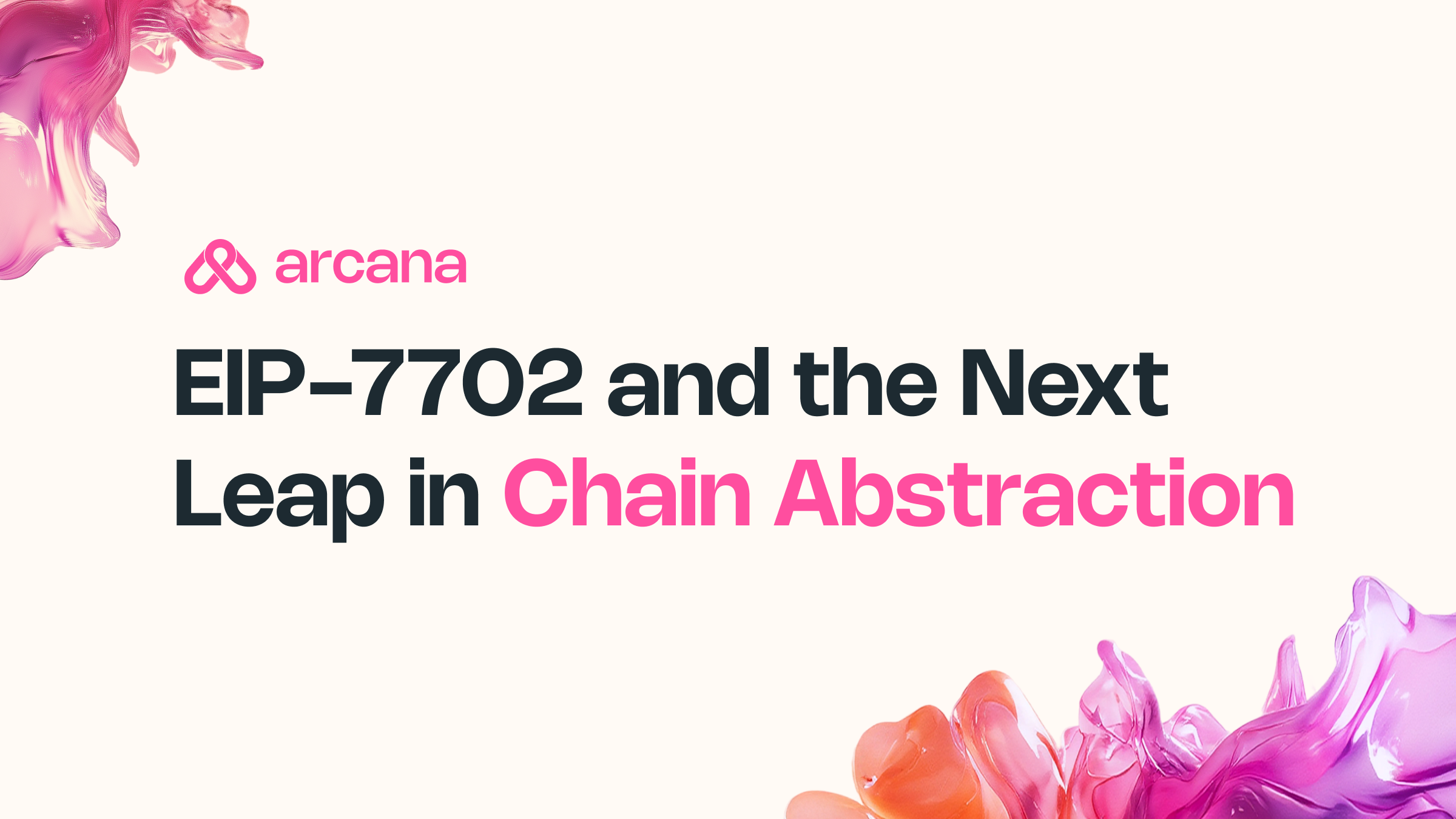EIP-7702 and the Next Leap in Chain Abstraction

Why Ethereum’s New Proposal is a Big Deal & How Arcana is Built for It
Last month, Ethereum received a major upgrade that could significantly alter how we interact across multiple chains: EIP-7702. While the name might sound technical, EIP-7702 simplifies many previously complex actions, such as token swaps, bridging, or interacting with apps across chains, by allowing them to occur through a single transaction.
This blog breaks down what EIP-7702 does, why it’s important for all Web3 users, and how Arcana is already building the infrastructure to take full advantage of it.
What is EIP-7702?
At its core, EIP-7702 introduces a new transaction type (type 4) that gives your regular Ethereum wallet (an Externally Owned Account, or EOA) smart contract-level powers through a single transaction.
Instead of requiring you to switch to a full Smart Contract Wallet, EIP-7702 lets your EOA delegate execution to a smart contract just once. This allows you to benefit from features such as bundling complex logic into a single, atomic transaction that contract wallets enable, but through your EOA.
It’s a delegation-based model, meaning your wallet authorizes a programmable payload that can include anything: token approvals, swaps, cross-chain transfers, gas sponsorships, and more.
Why It’s Important
Before EIP-7702, cross-chain UX was fragmented, brittle, and high-friction. Just sending tokens from Ethereum to Polygon could require 3+ separate transactions:
- Approve token for the DEX
- Swap ETH to stablecoin
- Approve bridge and execute the transfer
Waiting for each step to mine is slow and can cause failures or poor price execution in the end.
With EIP-7702, you can make multiple calls in one transaction. One signature.
EIP 7702 can supercharge Chain Abstraction by removing the number of clicks needed to transact across chains. Let’s break down the three killer features that make this possible.
1. Single-Signature Cross-Chain Execution
EIP-7702 introduces delegated logic execution, enabling users to sign a single transaction that performs multiple steps, even across chains.
- Want to swap ETH for DAI on Ethereum and bridge it to Base?
- You don’t need to sign three times.
- You sign once. The authorised contract handles the swap, bridge logic, and any callbacks.
2. Multi-Chain Delegation
EVM transactions typically include a specific chain_id—e.g., 1 for Ethereum, 10 for Optimism. With EIP-7702, it is possible for chain_id = 0, to delegate authorisation across multiple chains.
This means:
- A single signed EIP-7702 authorisation can be broadcasted to any chain, allowing EOAs to upgrade to a smart account across all EVM chains with just one signature
- Developers no longer need to generate a per-chain transaction for delegation.
3. Native Gas Sponsorship
One of the biggest hurdles in multi-chain UX: needing native gas tokens on each chain. EIP-7702 fixes that by allowing paymasters to be plugged into the transaction flow.
- Paymasters (dApps, services, or protocols) can cover gas fees.
- Users can pay in stablecoins like USDC/USDT or even get sponsored completely.
- It’s part of the same signature—no extra approvals or meta-transactions.
How Arcana Ties In?
Arcana’s Chain Abstraction takes a novel approach, enabling bridgeless interoperability with users’ EOA wallets like Metamask, Rabby, etc. While this has some obvious benefits over smart accounts, it would still need users to approve multiple allowances via the wallet.
For eg, User has USDC on Optimism, Base, Polygon and wants to spend the entire balance on Arbitrum. User will need to approve allowances on every chain individually and also approve the final transaction to the destination. With EIP-7702, these approvals can be batched into 1 click and thereby simplifying UX.
Final Thoughts
EIP-7702 doesn’t just add a new transaction type—it shifts Ethereum’s mental model from transactional steps to intent-driven actions. That’s exactly the future we are building toward with Arcana’s Chain Abstraction Protocol.
By simplifying how users interact across chains and making advanced actions feel native and seamless, EIP-7702 lays the groundwork for a more intuitive Web3. Arcana takes that foundation and turns it into real-world usability, where one signature can unlock any action, on any chain, without the complexity.

